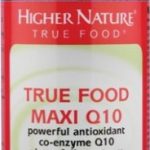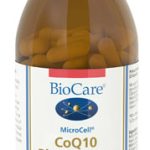It’s a regrettable fact of life… we all age and our bodies simply don’t perform when we’re older quite like they did when we were younger. Now, many of this accept this; many of us believe there’s no fountain of youth (newsflash: there isn’t) and no way to reverse the ageing process. Well, while that may be essentially true, it’s actually false that there isn’t anything we can do about it.
Take for instance, if you’re getting older, boosting your body’s levels of Co-Enzyme Q10. Your what, you may ask? Co-Enzyme Q10 (or simply CoQ10, as it’s often referred to) is a naturally-occurring nutrient in the human body; although neither a vitamin nor a mineral, the important role it plays in ensuring your body remains healthy and functions as it should often means it’s mentioned in the same breath as them. Primarily, it’s recognised as a major contributor to helping cells generate energy and a critical fighter against highly disruptive molecules known as free radicals that, in order to ‘complete themselves’, greatly damage cells and DNA.
Fair enough. So why should boosting your CoQ10 levels tackle the effects of ageing? Simple; because several physical issues and ailments usually associated with the ageing process (such as diabetes, Parkinson’s disease and heart problems1) can, it appears, cause deficiency of CoQ10 in the body. Ageing then, might be said to reduce the nutrient’s levels in your body; thus the need to increase these levels in later life.
Deficiency – why does it happen?
As stated, CoQ10 deficiency often occurs as a result of illness or, worse, disease. However, research suggests that the both low dietary intake and unusually high CoQ10 use within the body could also be causes2. Generally, though, it’s often suggested that, as people age, decreasing levels of CoQ10 occurs among those suffering with cancer, specific genetic conditions, HIV and AIDS and muscular dystrophies, as well as the aforementioned diabetes, heart problems and Parkinson’s disease – while it’s also believed certain prescription drugs may also be to blame for reduced levels of the nutrient2.
Benefits – heart health and muscle pain
A fair amount of research has been conducted in recent years on Co-Enzyme Q10 benefits – and one of the main findings seems to be CoQ10 may aid in reducing cholesterol levels and improve heart health. Indeed, some experts believe that, should the nutrient be combined in supplementation form with statins, even better results may be achieved.
Specifically, one study has found that patients suffering from heart failure experienced both fewer symptoms and reduced complications when taking CoQ10 supplements3, while the results of another suggest that CoQ10 may benefit the blood vessel health of both people who have heart disease and those who don’t4.
Also, research indicates that using supplements containing CoQ10 may reduce the breakdown, discomfort and pain of muscles that people having to take statins tend to endure. That said; it ought to be pointed out that another recent study seems to contradict the first one’s evidence in this area5.
Sources – diet and supplements
So, should you be concerned your body’s not producing enough CoQ10 (or, at least, not as much as it once did) and you could do with boosting your levels, where can you turn? Well, many experts would doubtless suggest the best source is the one that’s most natural – diet. Several foods are rich in Co-Enzyme Q10; oily fish and seafood like sardines and mackerel, whole grain foods and vegetables like broccoli, cauliflower and spinach6.
But what if, for one reason or another, you have dietary restrictions or run into difficultly assimilating the above foods into your daily diet? In that case, natural supplementation is undoubtedly the answer. The following – as well as several other – Co-Enzyme Q10 supplements are available via us at The Finchley Clinic; please do take a look at the dedicated page on our website for our CoQ10-containing products:
Lipsomal Q10 – the liposomal coating in this supplement delivers the CoQ10 directly to your cells.
True Food Maxi Q10 – contains CoQ10-enriched Saccharomyces cerevisiae (food yeast), ensuring the nutrient’s easily digested and absorbed for high bioavailability.
MicroCell CoQ10 Plus Omega – combines fish oil concentrate with CoQ10; fish oils may help to maintain your body’s healthy cholesterol levels.
References:
1. ‘CoQ10 and Statins: What You Need to Know’. Healthline.com. http://www.healthline.com/health/coq10-and-statins#coq1.
2. ‘Co-Enzyme Q10’. MayoClinic.com. http://www.mayoclinic.org/drugs-supplements/coenzyme-q10.
3. Sharma A., Fonarow G. C., Butler J., Ezekowitz J. A. and Felker G. M. ‘Coenzyme Q10 and Heart Failure: A State-of-the-Art Review’. Circ Heart Fail. Apr 2016; 9 (4): e002639.
4. Gao L., Mao Q., Cao J., Wang Y., Zhou X. and Fan L. ‘Effects of coenzyme Q10 on vascular endothelial function in humans: a meta-analysis of randomized controlled trials’. Atherosclerosis. Apr 2012; 221 (2): 311-6.
5. Caso G., Kelly P., McNurlan M. A. and Lawson W. E. ‘Effect of coenzyme q10 on myopathic symptoms in patients treated with statins’. Am J Cardiol. May 2007 15; 99 (10): 1409-12.
6. ‘All About CoQ10 (And How To Get It In Your Plant-Based Diet’. OneGreenPlanet.org. http://www.onegreenplanet.org/vegan-food/all-about-coq10-and-how-to-get-it-in-your-plant-based-diet.


